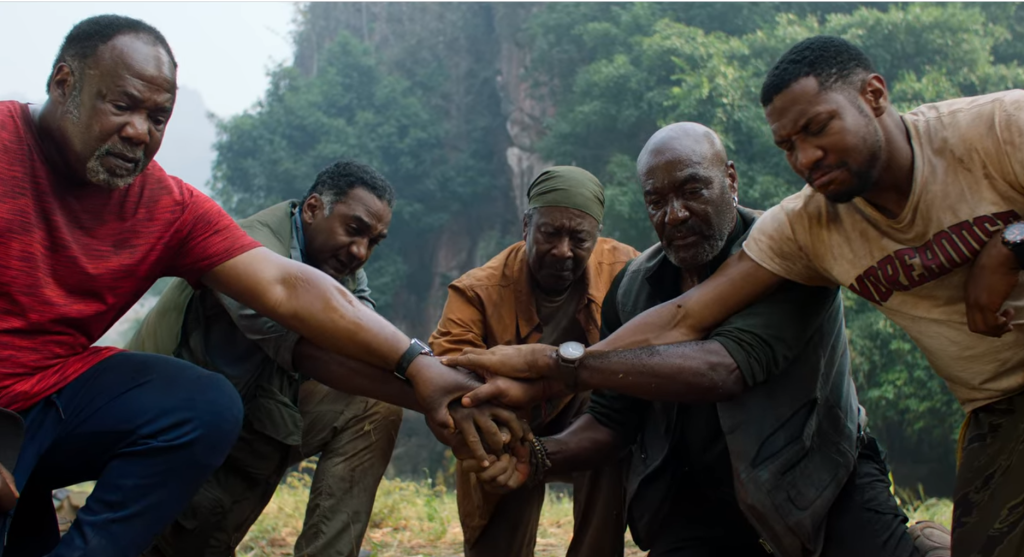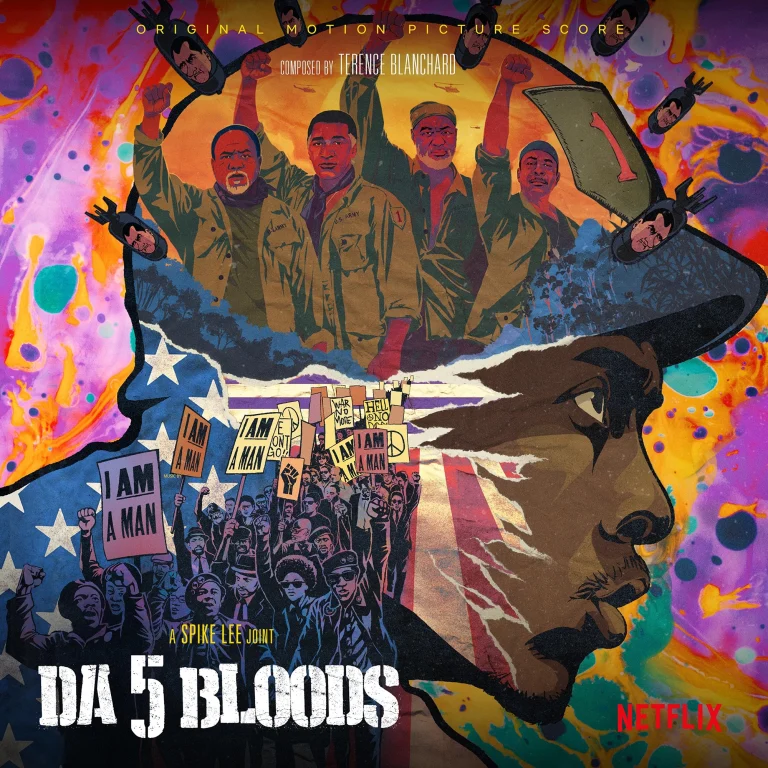Oscar Nominations:
Original Score (Terence Blanchard)
Da 5 Bloods is the latest movie from Spike Lee. His last big film, BlacKkKlansman was a huge success at the Oscars, winning the Oscar for Best Adapted Screenplay and nominated in five other categories – Best Picture, Supporting Actor, Director, Film Editing, and Original Score. It was also one of my favorite pictures from that year’s Oscar slate (2019).
This year’s offering from Lee, though, garnered only a nomination for Original Score, and the nominee, Terence Blanchard, was also the composer for the music in the earlier film. Blanchard is a jazz trumpeter, from New Orleans, who honed his skills playing with the Marsalis brothers. He brings a contemporary Black sensibility to his compositions which match the movies’ scenes whether they are contemplative or action-packed. I understand his nomination this year, although I also agree that the score for Soul was a better match with its movie.
What I’m not understanding is why this year’s Lee film did not receive any more recognition. Although it was fairly well reviewed by the critics (ranking 14th out of this year’s 41 films), the IMDB audience rating (based on around 49,000 ratings) placed it near the bottom. And it only received one, below-the-line, Oscar nomination. What happened?
Spike Lee hasn’t changed very much – he is still as political as ever. BlacKkKlansman skewers anti-black racism just as much as this year’s movie does. And yes, there is a great deal more graphic violence in Da 5 Bloods but it’s a war movie, so what really, does the audience expect? I’m doubtful that the violent content is the reason.
My best guess is that two big events have occurred which have significantly changed how Spike Lee films are received. The first of those is the Covid pandemic which has forced Americans out of theaters and onto their sofas as the main way to view movies. What that does is open up the competitive field in ways that I don’t think we understand yet. Da 5 Bloods may have briefly been in a theater, but, if so, it was only so it could qualify for an Oscar nomination at all. At the moment, it is only available on Netflix, but, even on that medium, there is so much competition. And it clearly isn’t going to get family viewing (as it shouldn’t!). So this film hasn’t generated a lot of popular buzz – there are too many other things out there to grab people’s attentions as we desperately try to fill our indoor time.
But there is also another event that, probably, has had an even bigger impact on the public reception for this film and that is the Trump movement. Lee makes no attempt to hide his contempt for Trump and everything he stands for. Da 5 Bloods was filmed during the final couple years of the Trump presidency and was released just four months before the election. Like the Borat film, part of the producers intent in releasing this film when they did was to influence the election – Lee makes clear in the movie what he thinks of Trump. But it has to be recognized that not everyone, by a long shot, in the viewing public agrees with Lee. With the polarization that has developed over the last few years, people no longer refrain from recording their negative opinions. In the past, we might have operated under the notion ‘if you can’t say something nice, then don’t say anything at all.’ But, in today’s world, we are much more likely to register our dissent. And, if you look at some of the user review comments in IMDB, it is clear that a large number of people disliked Lee’s politics so much that they intentionally brought the average popular rating for the movie down. (It also seems clear to me that at least some of those negative reviewers never even watched the film…)
And the Academy, seeking to avoid controversy when they could, decided to acknowledge the large number of negative opinions of the film and, therefore, gave it a token nomination – an underhanded acknowledgement of the Academy’s leftward lean, without putting the film in the spotlight. And so that’s my theory of why a film so highly ranked by the critics, did so poorly in public rankings and Academy recognition.
And that’s unfortunate, because this is a good movie. Lee, and his cinematographer (Newton Thomas Sigel: Bohemian Rhapsody – BAFTA), do some interesting things with aspect ratios, color saturations, and film graininess to switch back and forth between contemporary and Vietnam-era scenes. And that is necessary because Lee does not use ‘de-aging’ technology (as in The Irishman), to send his accomplished actors back in time. Filmed in Thailand and Vietnam, the landscape photography is real and beautiful.
Chadwick Boseman, in his next-to-the-last film before his death, plays a larger-than-life character whose Vietnam-era stature is as heroic as is T’challa roles in the Marvel films. While Boseman might be the biggest name actor in this film, the starring performance has to be from Delroy Lindo as Paul, the most complicated character in this movie and the one that carries the story. There are some very poignant moments when Paul, breaking the fourth wall, talks directly to the audience and during those moments you feel like you, too, are about to go down the rabbit hole.
The film is far from perfect – there are gaps in the story and characters that are undeveloped. The relationship between Hedy (a French NGO member looking to dismantle Vietnam-era landmines) and David (Paul’s son) is teased at but is totally undeveloped and probably could have been excised. And there is a very touching scene where one of the vets finds that he had abandoned something precious when he went back home after the war. But we don’t have an appropriate follow-up on that incredible scene later.
And of course, there is the Spike Lee politics. He bookends the film with video clips, and quotes, from Muhammad Ali and Dr. Martin Luther King, Jr. During the movie, there are inserts of lessons to educate the viewer on the role of Blacks in American history. And all of that is important to understanding this movie and the sentiments it is trying to nurture. All of which I am totally in agreement with.
But, I also have to stand with an observation made by a New York Times writer (Viet Thanh Nguyen) who was born in Vietnam and raised in the U.S. He made me understand that while Lee does a very effective job of portraying the racism towards Blacks, he doesn’t seem to also understand how he is furthering the racism against the poor Vietnamese. “Da 5 Bloods shows Black men as agents of their own destiny, capable of both heroism and horror, as we all are as human beings whose inhumanity is an inextricable part of ourselves…But so do the Vietnamese, Laotians, Cambodians and Hmong.” Lee shows them, in this film, as unneeded tour guides, begging peddlers, aging prostitutes, and, in an awkward early scene, as old Viet Cong whose only possible interaction with the Black vets is to buy them a drink and smile. Nguyen ends his essay with “A war story that repeats a purely American point of view will just help ensure that American wars continue, only with more diverse American soldiers and ever-newer targets to be killed or saved.”
Da 5 Bloods is a remarkable movie if only because it engenders all of these kinds of thoughts. In the end, this is a good, but not great movie. Recognize what it says and what you need to take away from this film. But also recognize what it doesn’t say, which is the same message, but bigger. Yes, Black Lives Matter, as all lives do. (4 Stars)
Available only on Netflix


